World’s top obstetricians laugh about Meghan Markle’s home birth plan at global summit – but others say the duchess is right to confront dangers of childbirth for black women in the UK
- The world’s top obstetricians and gynecologists gathered in Nashville this weekend
- Meghan Markle’s rumored plan for a home birth sparked fiery debates
- The UK recommends home births for low-risk pregnancies, the US does not
- Many top obstetricians laughed about the idea of a doula helping deliver the royal baby
- But some warned that Meghan’s alternative birth plans shine a light on the issues with hospital-delivered births
- The racial gap is bigger in the UK despite all the attention on America’s maternal mortality rate
- Black women are five times more likely to die in childbirth in the UK, and three times more likely in the US
- One top obstetrician said Meghan Markle is following in Serena Williams’ footsteps by forcing conversations on childbirth dangers
Meghan Markle’s imminent birth was on everyone’s lips at one of the world’s biggest gynecology and obstetrics conferences this weekend.
The Duchess of Sussex, who is expected to give birth any day soon, has reportedly flouted royal tradition by opting for a home birth with a midwife and a doula, a coach who is trained in holistic birthing techniques rather than medicine.
The rumor has sparked discussions about alternative birth plans among the general public – and ruffled some feathers among the world’s top obstetricians, who gathered in Nashville, Tennessee, for the annual meeting of the American College of Obstetricians and Gynecologists (ACOG).
‘Meghan Markle has decided she’s going to have a doula and a willow tree… let’s see how that goes,’ Dr Timothy Draycott, envoy of the Royal College of Gynaecology and a professor at the University of Bristol who received an award from the Queen in 2014, told an audience of majority US doctors to raucous laughter on Saturday.
‘She’s 37, first birth… I don’t know. We’ll have to see,’ he added.
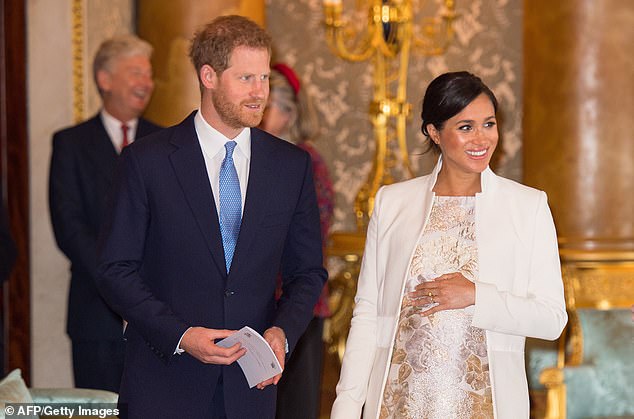
The world is still waiting for news of the birth of Prince Harry and Meghan’s first child. They are pictured together at Buckingham Palace on March 5
The idea of a home birth is not as preposterous in the UK as it would be in the US.
The Queen gave birth to all four of her children at home, some in Buckingham Palace, some in Clarence House, but childbirth has changed dramatically in the last six decades, and home births are now less common.
NICE (the National Institute for Health and Care Excellence), which writes the childbirth guidelines in the UK, published new rules in 2014 that said home births are appropriate, even beneficial, for almost half of low-risk births.
At 37, the Duchess is ‘geriatric’ in childbirth terms – two years too old to be classed ‘low risk’.
But the Royal College of Midwives says it’s up to the woman’s discretion, and if age is her only risk factor then a home birth would still be appropriate.
In the US, ACOG recommends against home births in all circumstances.
Home births are safer in the UK than the US because there is an integrated system of care to deal with it. In the early 1900s, the US ran a campaign to get women giving birth in controlled hospital settings, which involved denigrating midwives and elevating obstetricians.
‘We saw a very deliberate approach, with campaigns to move people into hospitals and out of their homes,’ Dr Lisa Kane Low, an associate professor at the University of Michigan School of Nursing, told DailyMail.com.
‘The strategy was to denigrate the midwives’ role in the home, and as the system evolved it was very medical-centric.
‘It wasn’t until much later that we’ve seen midwives participating again, and it was a certified nurse midwives [requiring a medical degree].’
In recent years, as the US has grappled with its high rate of maternal deaths, obstetricians have been discussing radical ways to overhaul the system, including pivoting towards midwife-led care, like the UK’s.
In the UK and Western Europe, fewer than 9.2 per 100,000 women die in childbirth.
In the US, 26.5 women die in childbirth – far closer to the rate in Mexico (38.9 per 100,000 live births), where 42 percent of the population lives below the poverty line.
Evidence suggests Europe’s low and dropping rate of deaths is largely thanks to midwives, and a low rate of C-sections, forceps, vacuum, inductions and other interventions.
Serena Williams, Beyonce, and testimonies from other black Americans have also forced a conversation about the racial gap in maternal mortality in the US.
Williams, who described her story in an op-ed, said she told the doctors she felt funny. They dismissed her concerns, saying ‘you just had a baby.’ Williams persisted, and it turned out she had a life-threatening pulmonary embolism that she narrowly survived.
Beyonce revealed she had pre-eclampsia, life-threatening pregnancy-related hypertension which can lead to a stroke, and disproportionately affects black women in the US.
Opening the ACOG meeting on Friday, President Lisa Hollier said ‘institutionalized racism’ is one of the biggest issues the US faces in turning the maternal mortality rate around.
While 9 percent of white maternal deaths are preventable in the US, 59 percent of African American mothers’ deaths could be avoided.
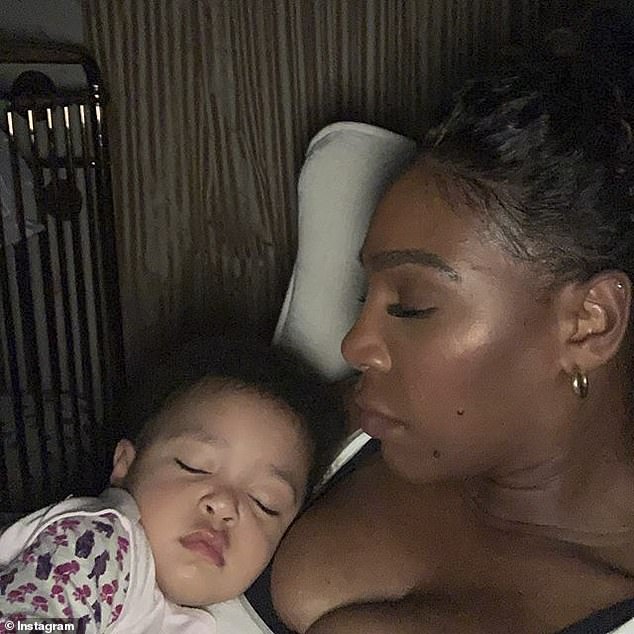
Serena Williams (pictured with her daughter Alexis Olympia), who described her story in an op-ed, said she told the doctors she felt funny. They dismissed her concerns, saying ‘you just had a baby.’ Williams persisted, and it turned out she had a life-threatening pulmonary embolism that she narrowly survived
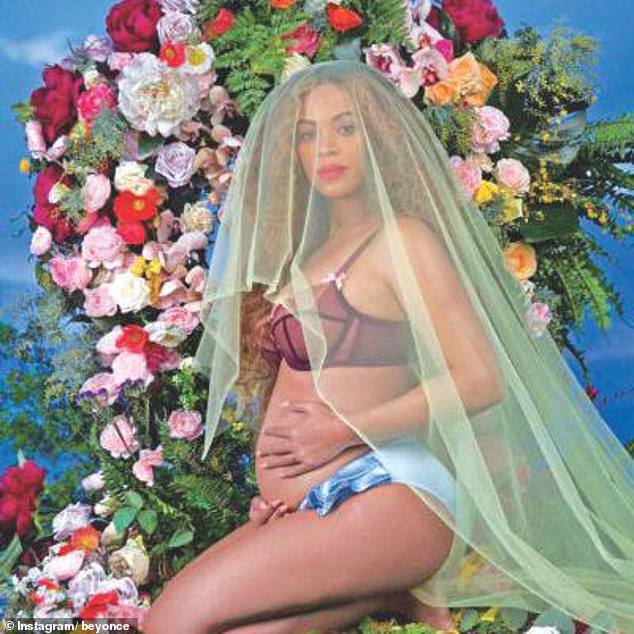
Beyonce revealed she had pre-eclampsia, life-threatening pregnancy-related hypertension which can lead to a stroke, and disproportionately affects black women in the US
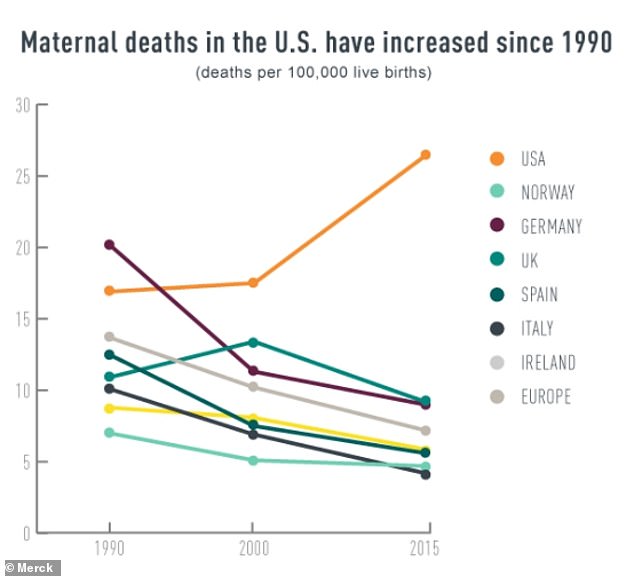
In the UK and Western Europe, fewer than 9.2 per 100,000 women die in childbirth. In the US, 26.5 women die in childbirth – far closer to the rate in Mexico (38.9 per 100,000 live births), where 42 percent of the population lives below the poverty line.
Part of it is structural – having health insurance lowers the risk, as does less stress and access to fresh food, all of which are less likely for African American women than white women.
Part of it is systemic – 75 percent of Title V funding for maternal care is dedicated to the baby, rather than the mother.
Part of it is social. Data in the US show doctors are less likely to acknowledge a black woman’s complaints of pain than a white woman’s.
‘It’s uncomfortable to say and hear but we have to start to pay attention in a different way and accept it,’ Dr Hollier said.
‘We need to be taking more care, we need to be saying, to every mom, every time, “look, I’m listening, I hear you.”‘
To combat the issue, a faction of doctors are driving a ‘movement’ to open more midwife-led centers in the US.
Steven Calvin, MD, an obstetrician who has keenly analyzed the European system for years, is leading the charge, quitting his job at a top hospital in Minneapolis to set up a handful of birth centers for low-risk women who do not need all the bells and whistles of hospital care.
‘Most women don’t need all that,’ Dr Calvin, who presented his model for birthing centers at the ACOG meeting on Saturday, told DailyMail.com. ‘We need to give women a bundle, options of care that fit them, rather than just focused on getting the baby out.’
Progress is slow, and getting insurance companies on board is complicated (it helps that Dr Calvin is an OBGYN, it is more complicated for midwives to strike deals that make birth centers cost-effective).
For women in areas without birth centers, demand for doulas – birthing coaches who are trained in breathing and meditative techniques, rather than medicine – is booming.
Rumors that a doula might be involved in the birth of Baby Sussex tickled doctors in the UK, where maternal care is widely recognized as high-quality.
But Dr Neel Shah, an obstetrician at Harvard Medical School, says the duchess is right to explore alternative birth plans given the barely-discussed issue of complications for black women in Britain.
The racial gap in maternal mortality is bigger in the UK than it is in the US.
Women of color in the UK are five times more likely to die in childbirth than white women, according to data from MBRRACE. In the US, they are three times more likely.
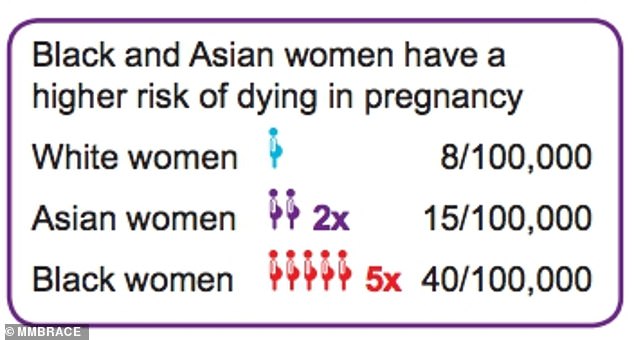
Black women in Britain are five times more likely to die in childbirth than white women, according to data from MBRRACE. In the US, they are three times more likely
Though the two countries have very different approaches to childbirth, and different kinds of racial tensions, Dr Shah doesn’t think it’s that different at all.
‘The racial disparity issue in the UK is the same thing as it is in the US,’ Dr Shah told DailyMail.com in Nashville on Saturday.
‘Meghan Markle is seeing this in color while the rest of us see this in black and white.’
Clinicians are trained to profile people, to test people of different races for things that, statistically, they’re more likely to suffer.
Sometimes that means black women are more often screened for conditions like sickle cell anemia, which is statistically more common in black women.
Often, Dr Shah warns, profiling manifests itself in other ways, driving doctors to see a patient as naturally less organized, more dramatic, or less educated.
‘Rather than recognize and mitigating our biases through the way other progressive workplaces might, in medicine we’re trained to amplify and hone our biases,’ Dr Shah said.
‘And you see how it plays out, it’s exactly what happened to Serena Williams, and that’s the thing that’s really striking about the racial disparity in childbirth,’ Dr Shah said.
‘It doesn’t matter if you’re the world’s best athlete, if you’re world famous. Income, status, education – they don’t protect you. Your perceived skin color is your risk factor.’
He added: ‘Meghan Markle wants dignity and safety is one dimension of dignity. She wants her own environment that she can control.
‘Having a baby is a moment of identity formation as a mother. People always remember it. ‘Survival is the floor of what women deserve in 2019. We should be aiming for the ceiling.
‘We want care that’s not just safe, but also empowering and supportive.’
